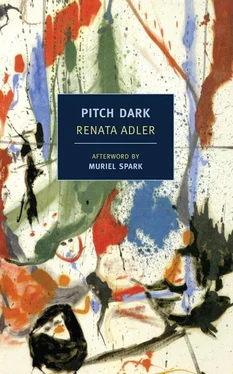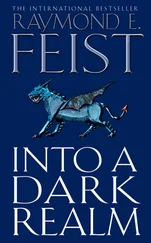Renata Adler - Pitch Dark
Здесь есть возможность читать онлайн «Renata Adler - Pitch Dark» весь текст электронной книги совершенно бесплатно (целиком полную версию без сокращений). В некоторых случаях можно слушать аудио, скачать через торрент в формате fb2 и присутствует краткое содержание. Год выпуска: 2013, Издательство: NYRB Classics, Жанр: Современная проза, на английском языке. Описание произведения, (предисловие) а так же отзывы посетителей доступны на портале библиотеки ЛибКат.
- Название:Pitch Dark
- Автор:
- Издательство:NYRB Classics
- Жанр:
- Год:2013
- ISBN:нет данных
- Рейтинг книги:3 / 5. Голосов: 1
-
Избранное:Добавить в избранное
- Отзывы:
-
Ваша оценка:
- 60
- 1
- 2
- 3
- 4
- 5
Pitch Dark: краткое содержание, описание и аннотация
Предлагаем к чтению аннотацию, описание, краткое содержание или предисловие (зависит от того, что написал сам автор книги «Pitch Dark»). Если вы не нашли необходимую информацию о книге — напишите в комментариях, мы постараемся отыскать её.
Pitch Dark Composed in the style of Renata Adler’s celebrated novel
and displaying her keen journalist’s eye and mastery of language, both simple and sublime,
is a bold and astonishing work of art.
Pitch Dark — читать онлайн бесплатно полную книгу (весь текст) целиком
Ниже представлен текст книги, разбитый по страницам. Система сохранения места последней прочитанной страницы, позволяет с удобством читать онлайн бесплатно книгу «Pitch Dark», без необходимости каждый раз заново искать на чём Вы остановились. Поставьте закладку, и сможете в любой момент перейти на страницу, на которой закончили чтение.
Интервал:
Закладка:
In the matter of solipsism and prayer. It makes no sense, of course, to pray if you alone exist, and there is no world outside your consciousness, unless you think of prayer as just a kind of song. A lonely song. But if you pray to something, and for something, it is also, I think, a solipsistic thing to pray to affect an outcome which, though still unknown, is already quite set. If you are a determinist, of course, then everything is and forever has been set, and all your prayers are songs. Not lonely songs, perhaps, but songs. The sort of prayer I mean, though, is the more ordinary kind: the devout expression of a wish, with a real intent to influence an outcome of some sort. And such a prayer, to be reasonable in a world where there are others, must address consequences that are truly and altogether in the future. It would be solipsistic, for example, to pray that the outcome of a test already taken will be this or that, or to affect the set result of any act already past. Such a prayer, though it has the appearance of reasonable anticipation, is already somewhat retroactive, a prayer for a miraculous revision of the past. While there’s nothing wrong with the miraculous, it always requires an abrogation of the law in one’s own special case: when it is also retroactive, it has an additional, though perhaps unconscious, solipsism at its heart. The tense, the perfected future of it, is the clue. You can pray that things will be other than as they were, other than they are. The forbidden, the solipsistic tense is this: that things will have been other than they were. Prayer must be timely and it must be prompt. Not even in a world of miracles, and only if the world is yours alone, can you pray the past away.
And the virtuoso, and the pachysandra, and love long ago, and the awful night of Eva dancing? “The only invitation to leave a road,” Judge Holmes once said, in a famous court decision, “is at its end.” The case involved what is called in law an attractive nuisance, something hazardous, an uncovered blade or well, an unattended piece of machinery, which might tempt a child to stray and hurt himself. The children in the Holmes case were more than hurt, they fell into a lake of chemicals and were dissolved. But the more one looks at the great judge’s words, the more clearly they are an instance of the hollow, perfectly specious aphorism. The one place at which roads normally extend no invitation whatsoever is at their ends. Every road’s invitation seems to lie either on it, as a means to reach a destination, or alongside, where its own destinations, diners, shops, and houses, are. At the end of a road, there is usually, at best, an intersection with another road. More commonly, there is nothing. Or a quarry, or a reservoir.
The Olive Pell Bible, one of the best-selling Bibles of its time though not perhaps in history, was an expurgated Bible. Mrs. Pell had begun by crossing out and removing from the Bibles of her friends any passage with a carnal implication, including, to name just one example, the begats. The result, as it turned out, was a very short, dense text. Her friends soon urged Mrs. Pell to give the public the benefit of all the talent and industry required for such a condensation, and so the Olive Pell Bible went into the first of its many printings. It is very hard to obtain a copy now.
An hour later, I am back, from my walk, in my own room at the castle. On the rug, in the hallway, outside a room two doors from mine, I have noticed a pail, an empty bottle of Evian water, and a towel. In discussing the routine of the castle, the ambassador said, I now remember, Kathleen will give you bottled water. There was no bottled water in my room, and the water, not just from the taps, but also in the glass beside my plate at table, I have also noticed, is distinctly brown. I don’t mind brown water, having used it on visits to friends in South Carolina and Georgia; I had even rather liked the sulphur smell. Nonetheless, there is now something disturbing, something in the nature, can it be? of a statement, or declaration, about that empty Evian bottle. I hear Celia’s voice and Kathleen’s nearby, and I think, It is nothing, jet lag maybe or a hangover. They are cleaning out a room. What could be more normal than a pail, an empty bottle, and a towel. I look around my room, rearrange a few things in the closet, put on a dry pair of shoes and socks. In the basket which holds the peat beside the fireplace, I now notice several spent, old, yellowed cigarette stubs. Though they are clearly remnants of some earlier visit, I wonder whether it will somehow be thought that they are mine. Not wanting to be thought that sort of guest, and also from an innate sense that they just don’t belong there, I start to rummage in the peat and pick them out. When I have gathered the first handful of these crumpled objects, along with their bits of loose tobacco, I become aware of what I begin now to consider a distinct air of growing conspiracy. I hope that the ambassador will remember, even on the basis of our few and short encounters, that I do not smoke. Perhaps this is the moment when the fantasy, or paranoia, or whatever it is, sets in in earnest, only in reverse, as a form of faith: faith that the ambassador, when he sees or hears about these filthy cigarette ends, will recall that I am not a smoker, and therefore cannot be to blame for them. So, getting the hang of this castle war, if war it is, of stubbornnesses; not knowing, anyway, where else to put them; and having more difficulty than I thought extricating all the remaining stubs and stray remnants of tobacco, I rebury them now among the peat.
When I go downstairs, the kitchen is empty. On the table, I find the picnic lunch box — rather like the pails, with buckles, which we used to take our lunch to school in. I set out again on my walk. Where the path veers uphill from the sea, I continue along the sea’s edge. Though I am damp and chilled, I find a large flat rock, sheltered from the wind by other rocks. From the cup of the thermos I drink soup, the same oxtail soup they served last night at dinner, but so hot that it burns as it goes down. Good, I imagine, for what remains of my slight cough. The sandwiches are white bread with ham, the same ham they were frying with their eggs at breakfast. There is also a tomato sandwich, an orange, a hardboiled egg. I eat and drink all this hunkered among the rocks. In a corner of the kitchen, when I first met Celia, there had been a tall, stooped man, whom I took to be Pat. He did not speak, and we were not introduced. Now, on my return, this silent man is working, with a power saw, under Paddy’s supervision, just inside the gravel circle. He pauses, smiles at me, waves, and resumes his work. I mention to Paddy that the Waltons have invited me to dinner, and that the Captain said to ask Paddy for directions to their house. Paddy thinks, says, I can’t, starts to give directions, breaks off, says, I can’t, you see, I’ve lived here all my life. This makes a kind of sense. Many people find it hard to give directions, when they are too familiar with the way. At the same time, it seems odd, since both the ambassador and the Waltons have designated Paddy as a guide. I know, he says, why don’t you ask Kathleen. Her boy is at school not far from there. You can follow her when she goes to pick him up. I ask when that will be. Late this afternoon, he says; but then adds, very slowly and firmly, You must go and ask her now. I go upstairs, where the pail, the dirty white towel and the empty Evian bottle are still on the hallway rug, and I walk into the room where Kathleen and Celia are. They don’t look up. When I ask, Kathleen says she picks up the child half past two, quarter to three. Paddy’s idea, perhaps, of late afternoon. As I lie down, in my room, to rest and perhaps read a bit, I begin to review whether these can really be what I must regard as a virtual campaign of intransigences. The business of the firestarter and the matches, the immense then suddenly diminished dessert, even the question whether I’ve known the ambassador long, now range beside the lack of bottled water, the unlighted lamps, the resistance, when I arrived, in the matter of the phone. I think, It’s absurd, it is just that I’ve been too long alone. My sense that there is something wrong in the course of these events begins, after all, with the small matter of the car; and, in the matter of the car, it is I who am at fault. I look toward the grate. No matches. No firestarter. Crumpled cigarette ends. I hear a car start, go to the window, see behind the wheel a sweatered bosom, assume it is Kathleen. As I walk downstairs, and see that the car is already at the far end of the driveway, I think, I am going to leave this country and this house.
Читать дальшеИнтервал:
Закладка:
Похожие книги на «Pitch Dark»
Представляем Вашему вниманию похожие книги на «Pitch Dark» списком для выбора. Мы отобрали схожую по названию и смыслу литературу в надежде предоставить читателям больше вариантов отыскать новые, интересные, ещё непрочитанные произведения.
Обсуждение, отзывы о книге «Pitch Dark» и просто собственные мнения читателей. Оставьте ваши комментарии, напишите, что Вы думаете о произведении, его смысле или главных героях. Укажите что конкретно понравилось, а что нет, и почему Вы так считаете.












